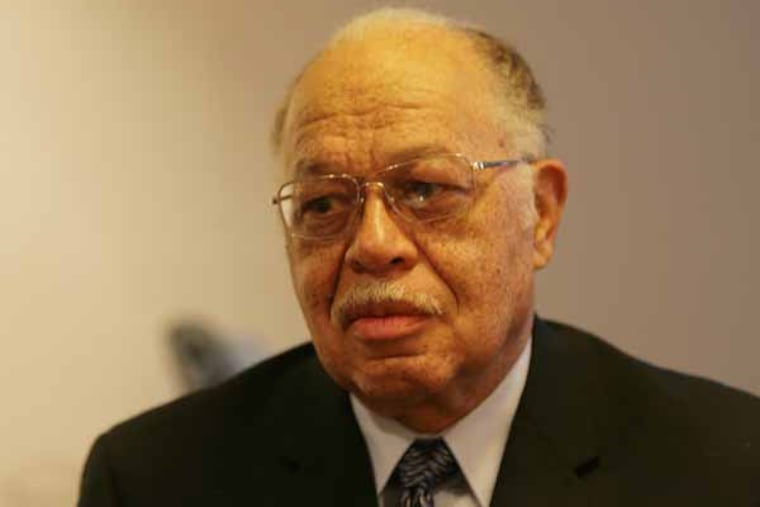Staffer at clinic describes 'residency' in assisting Gosnell
After seven years as a biochemical researcher, years more dabbling as a partner in a Charlottesville, Va., bar, and medical school in the Caribbean island of Grenada, Steve Massof said it was time to go to his "backup plan" - become a doctor.

After seven years as a biochemical researcher, years more dabbling as a partner in a Charlottesville, Va., bar, and medical school in the Caribbean island of Grenada, Steve Massof said it was time to go to his "backup plan" - become a doctor.
But finding a medical residency program was tough for someone looking in the "offseason" and just starting to take the licensing exams.
Then, Massof said, his brother-in-law, a pharmaceutical firm representative, told him about a West Philadelphia doctor he regularly visited: Kermit Gosnell.
Testifying Thursday at Gosnell's Philadelphia murder trial, Massof told a Philadelphia jury about his hands-on residency in urban family medicine under Gosnell's tutelage.
Massof said his rise was quick: Within a month he was seeing his own patients and writing prescriptions on Gosnell's presigned pads. He moved on to assisting Gosnell in late-term abortions and soon was doing them himself.
"I worked hard, extremely hard," Massof testified.
Today, at age 50, Massof still doesn't have his medical license - he later learned Gosnell's "residency" was not accredited - or a job.
Massof does have a roof over his head courtesy of the Federal Bureau of Prisons: He pleaded guilty in federal and Common Pleas Courts, agreeing to testify against Gosnell to escape the possibility of the death penalty or life in prison.
Massof was one of nine Gosnell employees charged in 2011 in connection with illegal late-term abortions performed at Gosnell's Women's Medical Society clinic at 3801 Lancaster Ave.
Like Gosnell, Massof was charged with first-degree murder for killing infants born live and viable during abortions. He would have faced a possible death sentence if the jury found him guilty.
Unlike Gosnell, Massof struck a deal with prosecutors, pleading guilty to two counts of third-degree murder in exchange for his testimony and the lure of a lighter prison sentence.
In federal court, he pleaded guilty to 30 counts of using Gosnell's prescription pads for controlled narcotics that were sold on the streets. Gosnell is to be tried there after the murder case is over.
Dressed in the olive green uniform of a federal prisoner, Massof blithely described the five years he worked for Gosnell before leaving in June 2008.
It was tough training at the side of a man he considered a "master" of urban medicine until the workload, deteriorating clinic standards, and disagreements with another employee wore him down.
"I felt like a fireman in hell - I couldn't put out all the fires," testified Massof, who said he was paid $300 a week.
Massof at times exhibited an almost ghoulish glee, smiling and giggling, as he described the abortions he did and infants whose spines he snipped with surgical scissors.
"No babies would be born alive at 3801," Massof said Gosnell told him.
At one point Massof asked jurors to feel the backs of their necks and he guided them to the spot where he would use scissors. Several jurors did.
"It's like a beheading," Massof said.
Massof's testimony took up most of Thursday's trial session. The prosecutors will continue presenting their case when the trial resumes Monday.
As Thursday's testimony continued, passersby outside at Filbert and Juniper Streets watched a noon news conference where leaders of two black antiabortion groups denounced Gosnell as a "racist of the worst kind" and a "butcher who preyed on the women and girls of his own race."
Day Gardner, president of the Washington-based National Black Pro-Life Union and the Rev. Clenard Howard Childress Jr. of Learn Northeast, based in Montclair, N.J., also criticized state health officials for allowing Gosnell to operate his abortion clinic without inspection for more than a decade.
"Kermit Gosnell killed children because he could," Gardner said. "After all, they were mostly black children and who will really care about black babies? Just another black child - dead in Philadelphia."
No Pennsylvania health officials were criminally charged as a result of the 2011 county grand jury report that led to the arrest of Gosnell, 72, and nine employees.
But the grand jury report criticized state officials for wanting to avoid a controversial political issue and turning a blind eye because Gosnell's practice largely affected poor, inner-city black women.
A month after the grand jury report, the Corbett administration fired four state lawyers and two supervisors at the state Departments of Health and State for failing to ensure inspection of state abortion providers for more than a decade.
Gardner was one of a handful of antiabortion activists in court this week monitoring the Gosnell trial.
Childress and Gardner also criticized the lack of national media coverage of the trial.
"Why is it that the children mercilessly killed by Kermit Gosnell should get less attention than the death of little Caylee Anthony, Connor Peterson, or any of the other children whose lives were cut so terribly, terribly short?" Gardner asked.
Joining the pair were two Philadelphia women, one of whom described how she almost died during an abortion, and representatives of antiabortion groups from Washington, D.C., Pennsylvania, and New Jersey.